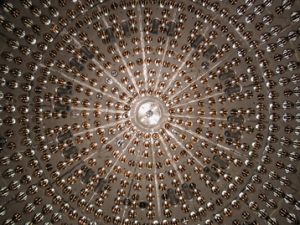Aug 30 2014
For the first time ever, solar energy has been directly measured at the very instant it is produced. A world-first experiment carried out with the Borexino detector has observed, almost in real time, the flux of low-energy neutrinos emitted by the Sun, and shown that solar activity has hardly changed at all for over a hundred thousand years.
These results obtained by the Borexino collaboration1, which includes the Laboratoire AstroParticule et Cosmologie (CNRS/CEA/Université Paris Diderot/Observatoire de Paris), are published on 28 August 2014 in the journal Nature.
 The Borexino detector © Copyright : A. Brigatti, INFN
The Borexino detector © Copyright : A. Brigatti, INFN
Over 99% of the Sun's energy is generated by the fusion of hydrogen nuclei (protons) within the core of the star. This primary reaction transforms two protons into a deuterium nucleus, emitting a positron and a low-energy neutrino called a pp neutrino. The Borexino detector, set up in the Gran Sasso underground laboratory of the National Institute for Nuclear Physics (INFN) in Italy, has successfully carried out the first direct measurement of the flux of these pp neutrinos.
Once produced, the neutrinos travel through the solar plasma in just a few seconds, reaching Earth eight minutes later. On the other hand, the energy produced by the reaction at the same time as the neutrinos is carried in the form of photons that take one to two hundred thousand years to travel through the Sun's dense matter before reaching our planet. The neutrinos observed during this experiment are thus direct evidence of what is happening in the Sun's core at the present time, whereas the solar energy that warms us was generated a long time ago.
During the experiment a neutrino flux of 6.6*1010 neutrinos per cm2 per second was measured. This is equivalent to the Sun having a power of 3.98*1026 watts, a value similar to the one obtained by measuring solar energy from the radiation that lights and heats the Earth (3.84*1026 watts). A comparison of these two measurements shows that the Sun is in complete thermodynamic equilibrium: its activity has hardly changed for over one hundred thousand years. These findings strengthen our current understanding of solar dynamics, and confirm that the Sun will continue to behave in a similar way for at least the next hundred thousand years.
This new measurement enables the Borexino experiment to complete the spectroscopy of solar neutrinos and represents a unique achievement. This is the only detector in the world to have successfully measured the flux of pp neutrinos, which, although the most numerous, are also the hardest to detect. Neutrinos, which only interact via weak interaction, are generally hard to detect. In this case, measuring them was even more difficult due to the extremely low energy of pp neutrinos. The Borexino detector is particularly efficient at eliminating the background noise that interferes with measurements at low energies. It is housed under 1400 meters of rock that absorbs cosmic rays, and the high technology developed for the experiment enables traces of radioactivity to be reduced to a level never previously attained (ten billion times less radioactivity than in a glass of water). It was these unique features that made this world first possible.
(1) The Borexino experiment is the result of a collaboration between several European countries (Italy, Germany, France, Poland), the United States and Russia, bringing together over 100 physicists, engineers and technicians. In France, the researchers of the Laboratoire Astroparticule et Cosmologie (CNRS/CEA/Université Paris Diderot/Observatoire de Paris) joined the collaboration in 2000. They are supported by IN2P3, Université Paris Diderot, Labex UnivEarthS and Laboratoire APC.
Source: http://www.cnrs.fr/